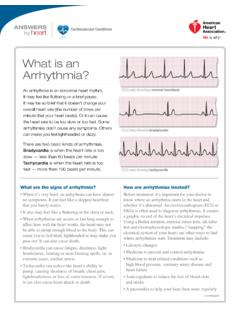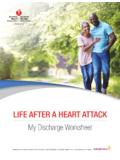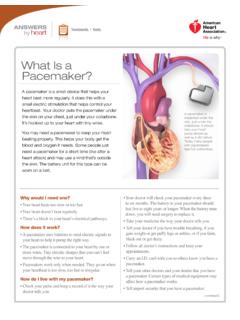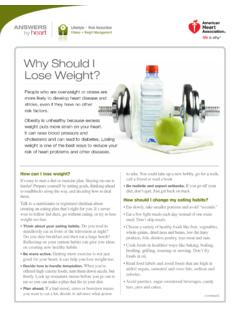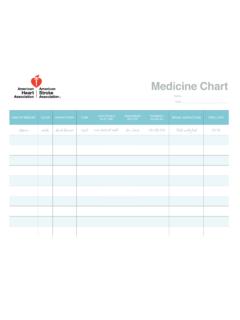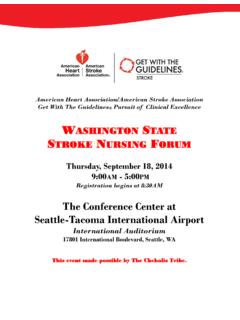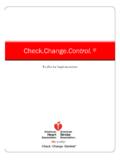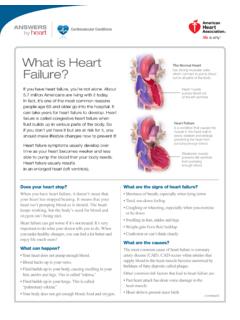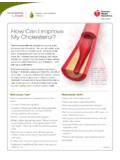Transcription of Program FREQUENTLY ASKED QUESTIONS - Heart
1 RQI FAQ p. 1 of 8 Resuscitation Quality Improvement Program FREQUENTLY ASKED QUESTIONS Below are answers to FREQUENTLY ASKED QUESTIONS about the Resuscitation Quality Improvement (RQI) Program . If you have a question that is not addressed below or want to schedule a site assessment, please contact us at question Answer What is the RQI Program ? The RQI Program is a new subscription-based american Heart association (AHA) solution to address the problem of rapid CPR skills decay after initial training. The Program is a cloud-based, turnkey learning and training service from the AHA, with learning technology from Laerdal.
2 The Program includes cognitive components that are delivered online and psychomotor skills assessments that can be performed at mobile Simulation Stations. The stations are equipped with adult and infant manikins and a tablet computer that connects the student to the training material. The Program also includes toll-free telephone support and management of hardware. The RQI Program allows for more patient care and less administrative paperwork. Participant completion cards never expire if students continue to participate in the Program every 90 days.
3 What is the evidence that CPR skills rapidly decay? Several studies have demonstrated this rapid skills decay, with some studies showing deterioration as quickly as six months after training. An annotated bibliography on the RQI website ( ) provides references to these articles. Other key articles are referenced in both the 2010 AHA Guidelines for CPR and Emergency Cardiovascular Care (ECC) and the 2013 AHA consensus statement, Strategies for Improving Survival After In-Hospital Cardiac Arrest in the United States: 2013 Consensus Recommendations (Morrison et al.)
4 Circulation. 2013;127:1538-1563). Copies of these publications are available through your AHA representative. How does the RQI Program address rapid skills decay? The RQI Program provides cognitive learning modules in the form of educational videos, eSimulation patient cases and multiple-choice exam QUESTIONS . After successful completion of the cognitive modules, students perform self-directed, quarterly skills drills that take an average of 10 minutes to complete. Simulation Stations are strategically placed in the facility so students can easily access them 24/7.
5 RQI FAQ p. 2 of 8 question Answer Through these quarterly drills, students skills are assessed and reinforced to help healthcare providers achieve and maintain high-quality CPR performance. Due to RQI s reduced training time, there is more time for direct patient care/patient related duties. More frequent skills training keeps providers more prepared for emergencies and delivering CPR (resuscitation events). What are the AHA, Laerdal, & HealthStream s respective contributions to the RQI Program ? The complementary skills of the AHA, Laerdal and HealthStream make the RQI Program possible: o AHA s recognition as the leader in resuscitation science, education and training o Laerdal s innovative simulation technology o HealthStream s established Learning Management System What is the cost of the RQI Program ?
6 The cost of the RQI Program is based upon the exact configuration of your institution, including the types of course completion cards required (Basic Life Support [BLS] and Advanced Cardiovascular Life Support [ACLS]), the number of students requiring cards, the number of Simulation Stations required and the number of years in the Program contract. This information will be gathered by a Program representative during a site assessment. When compared with Instructor-led training and conventional eLearning methods, the RQI Program may be more cost effective.
7 Pricing is locked in for the duration of your contract and will not be affected by Guidelines updates until the contract period concludes. To determine potential cost savings, you must take into account the following: o The amount your organization currently spends on BLS and/or ACLS training, implementation and maintenance of your training system o The attrition rate of your employees who participate in training o Cost of conventional training versus time off the floor, time spent participating in training, cost of having employees participate in training, cost of paying for replacement employees during training, and additional costs related to the current two-year training cycle model.
8 Compare the current training costs to the estimates derived from the Quick Quote to reveal how cost differences are projected to affect your financial bottom line. Contact your RQI representative for a site assessment, a Quick Quote and a cost comparison for your institution. What are students in the The RQI Program includes the same cognitive and skill modules as a conventional CPR training Program . The difference is that the RQI RQI FAQ p. 3 of 8 question Answer RQI Program required to do? Program delivers the full training content over a two-year time period rather than in one day every two years.
9 Both the cognitive and skills modules are assigned to students, with deadlines for completion of the modules to keep their cards current. Cognitive modules may be completed on a computer with Internet access over the course of two years, with the adult content completed in the first year and the child/infant content completed in the second year. Students complete the skills modules on a quarterly basis at the Simulation Station, which provides helpful visual and audio feedback for compressions and ventilations, monitors the quality of performance and provides reinforcement or suggestions for improvement.
10 Regular skills practice helps keep employees better prepared to administer CPR and contribute to improved patient outcomes. How do I know that the RQI Program works? During the three-year development phase of the RQI Program , the AHA conducted pilot tests and site evaluations to gauge the functionality of the Program and satisfaction of educators and students. The overall response from the pilot tests was positive, and users suggestions for improvement were incorporated into the final RQI Program design. The RQI Skills Station is intended to be placed on the unit where quarterly assessments can be done on the manikin to maintain participants course completion cards.
